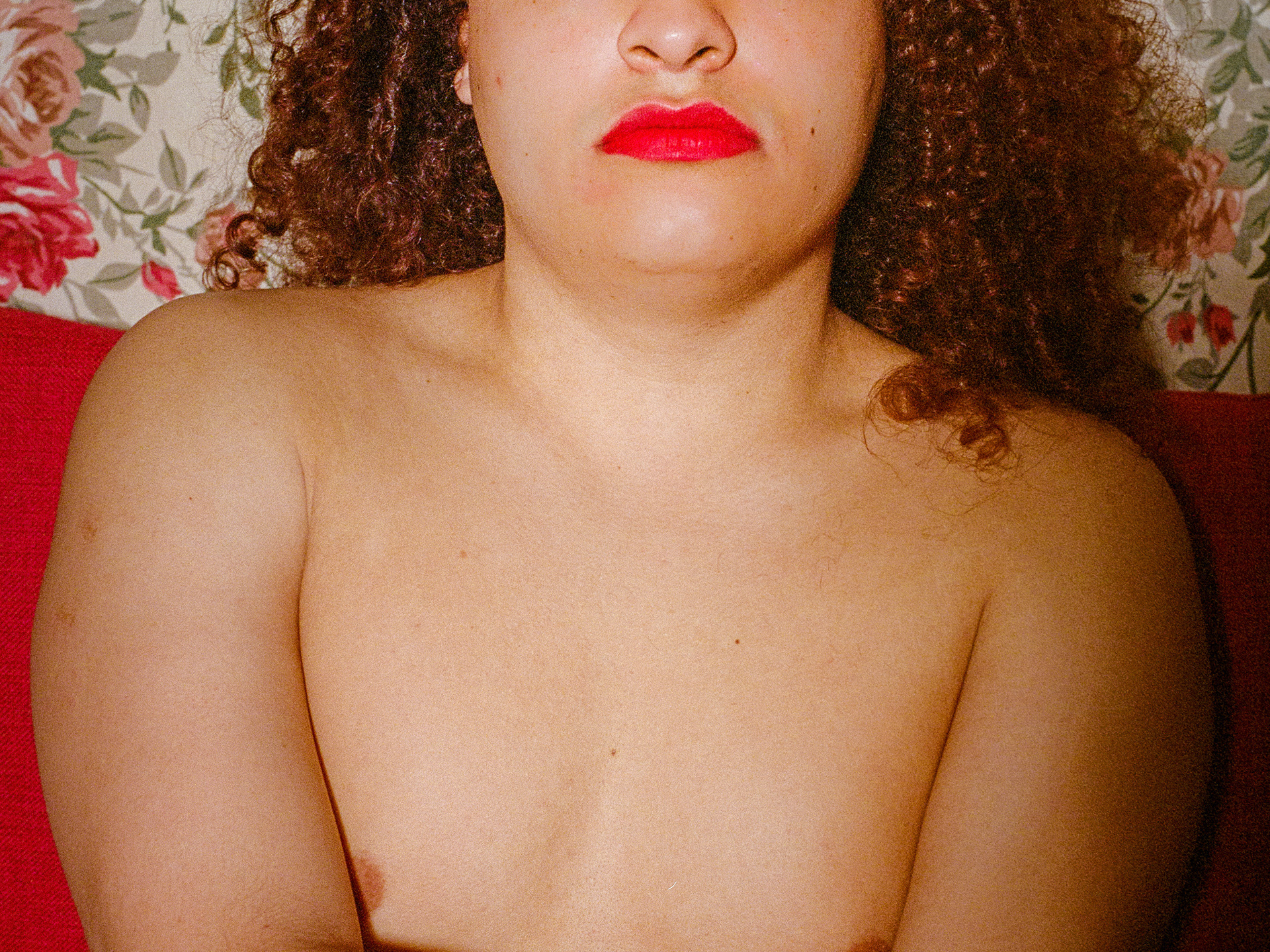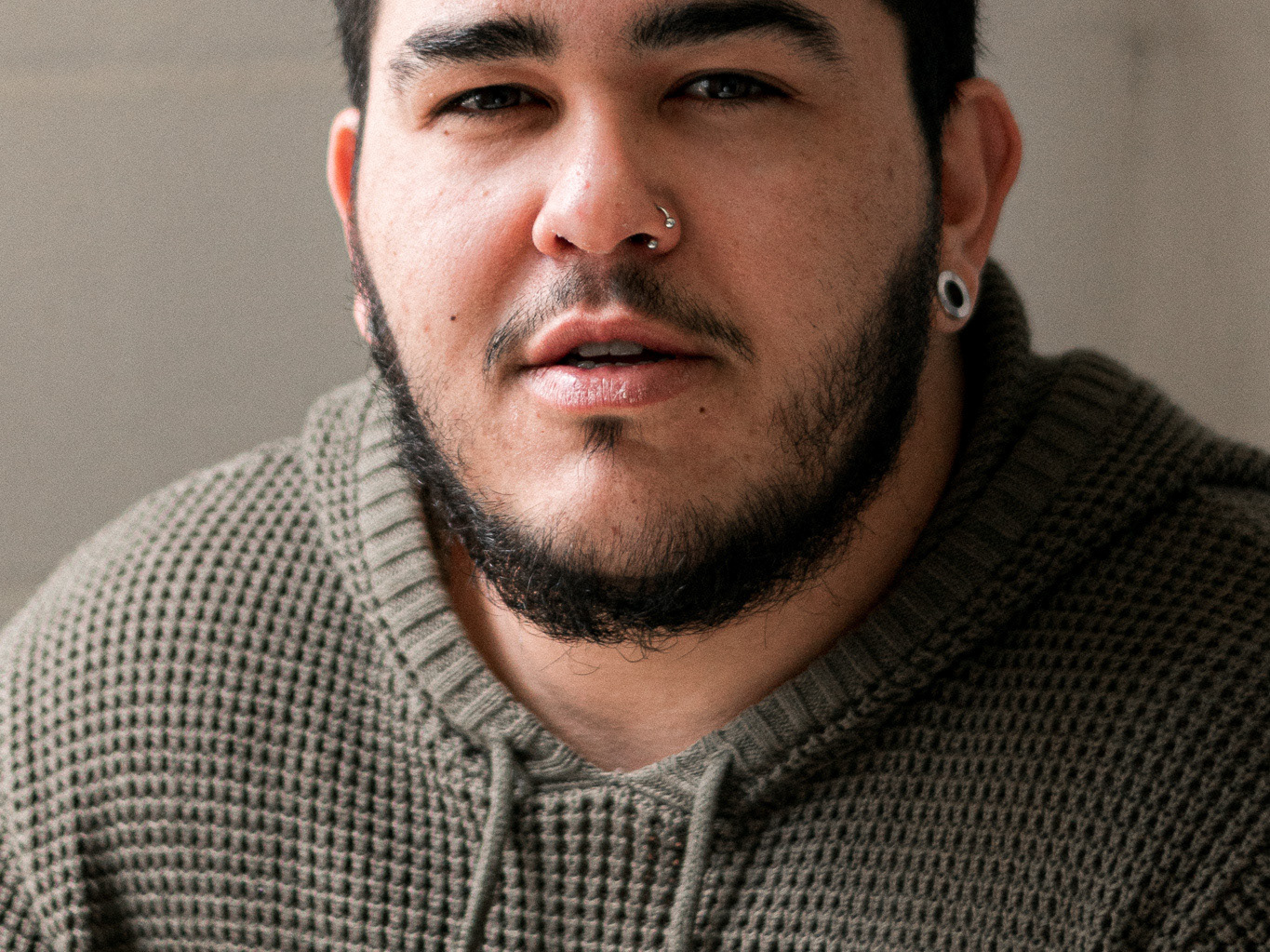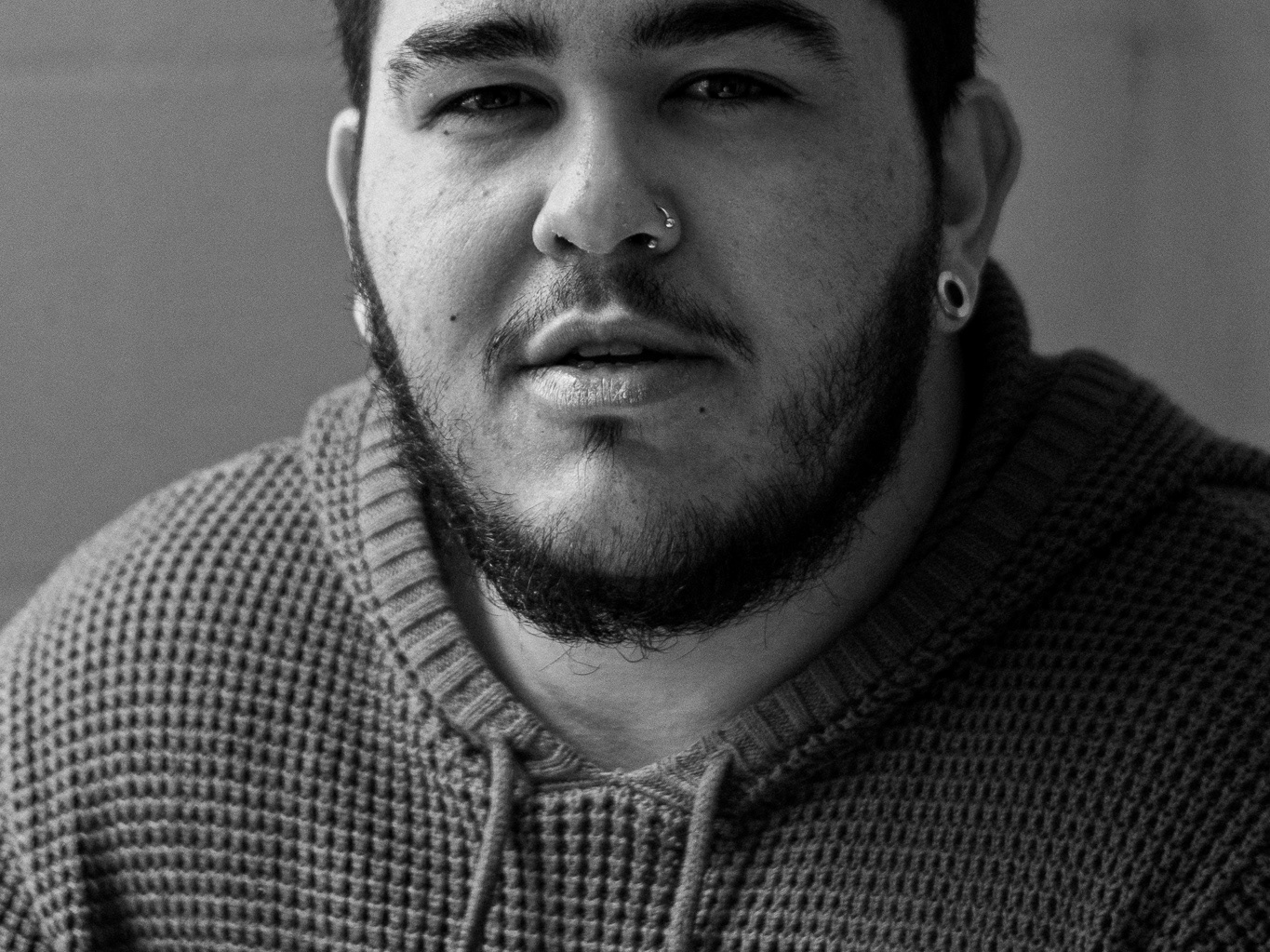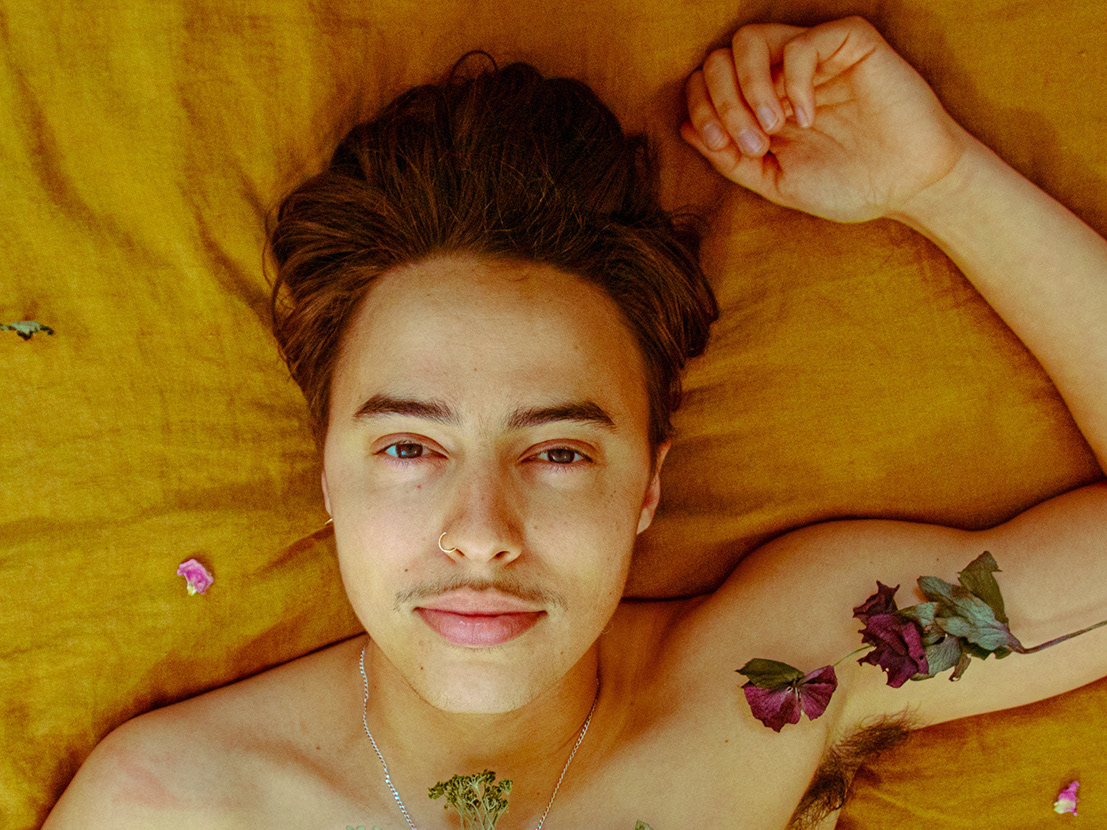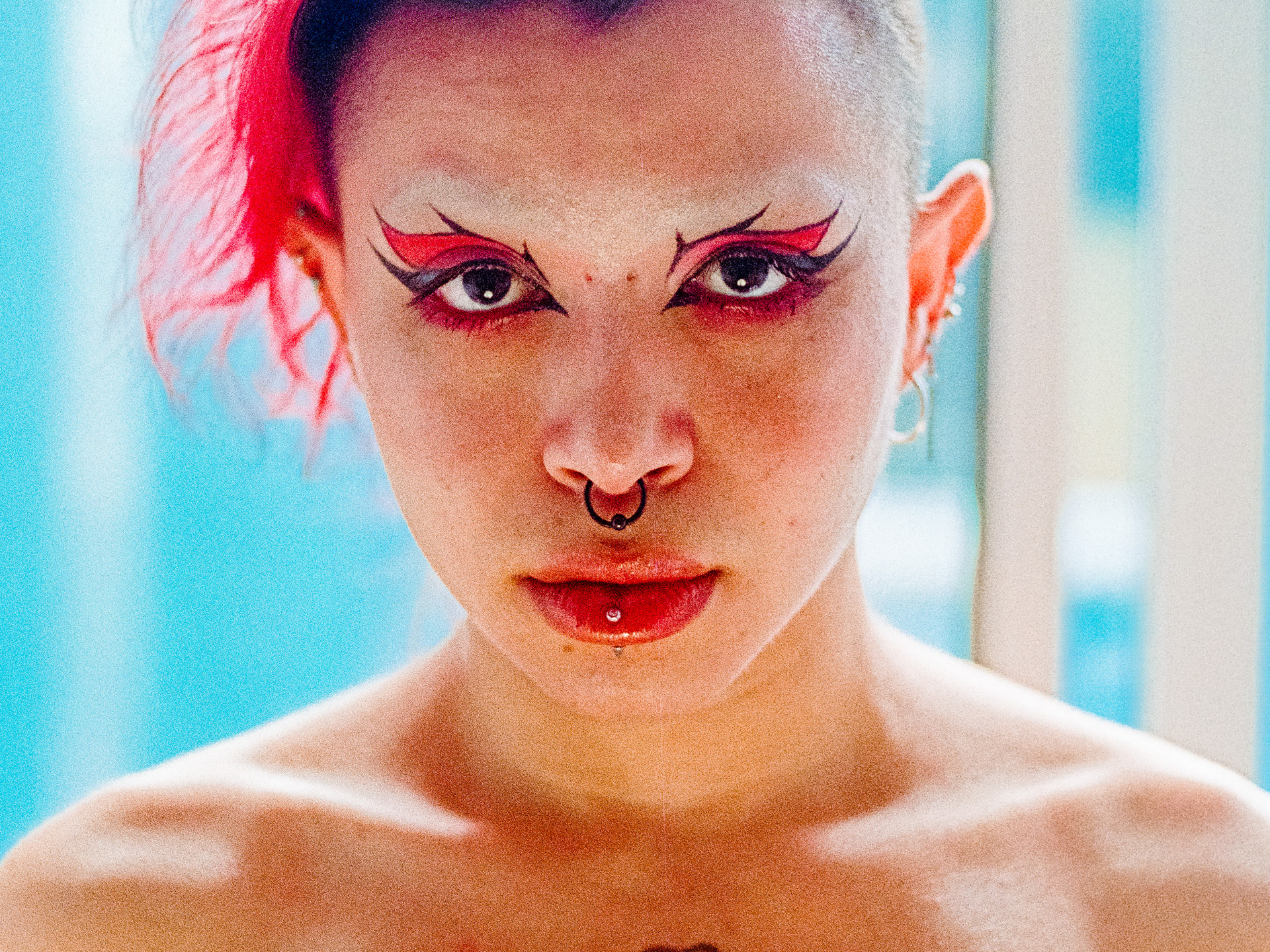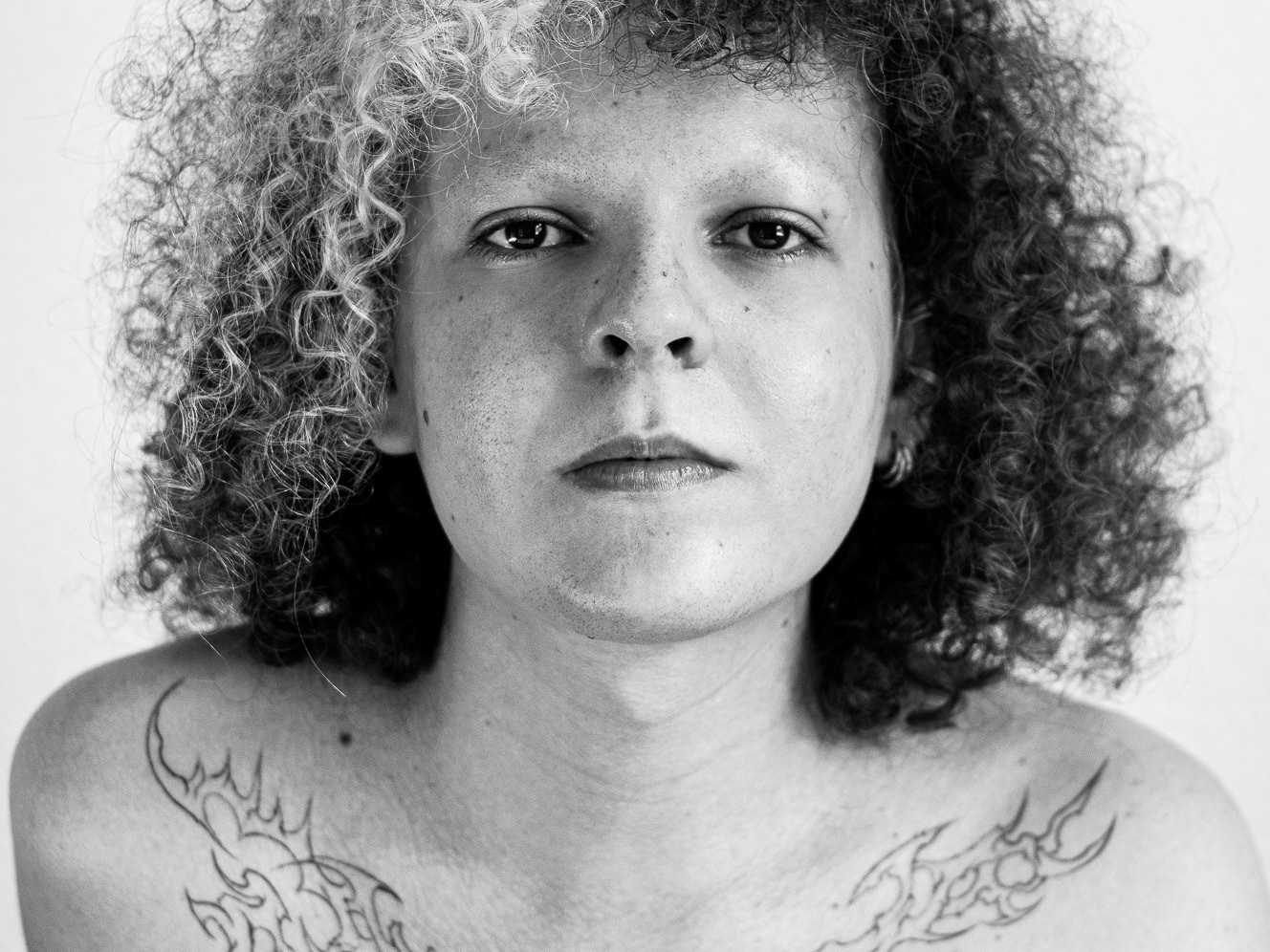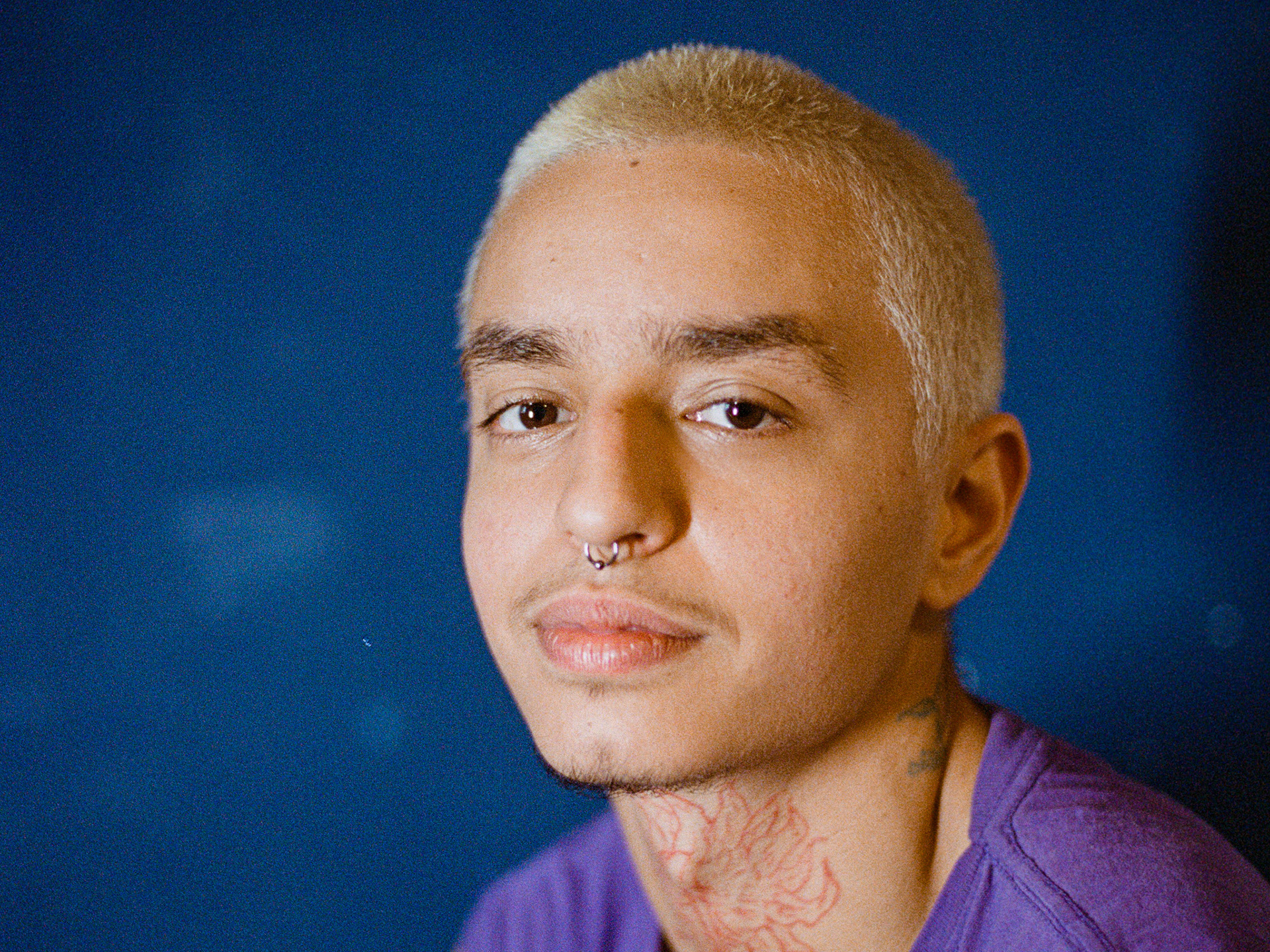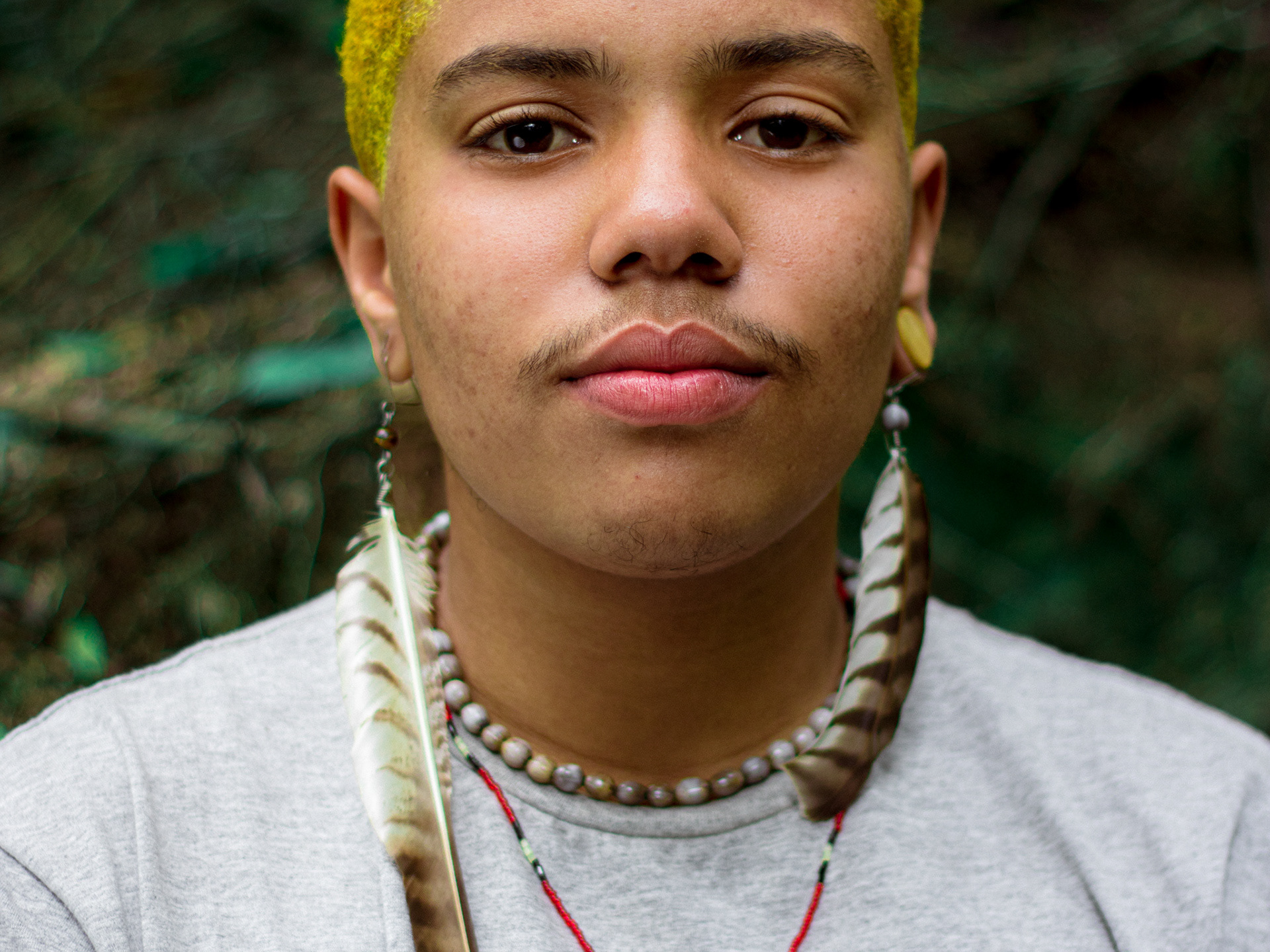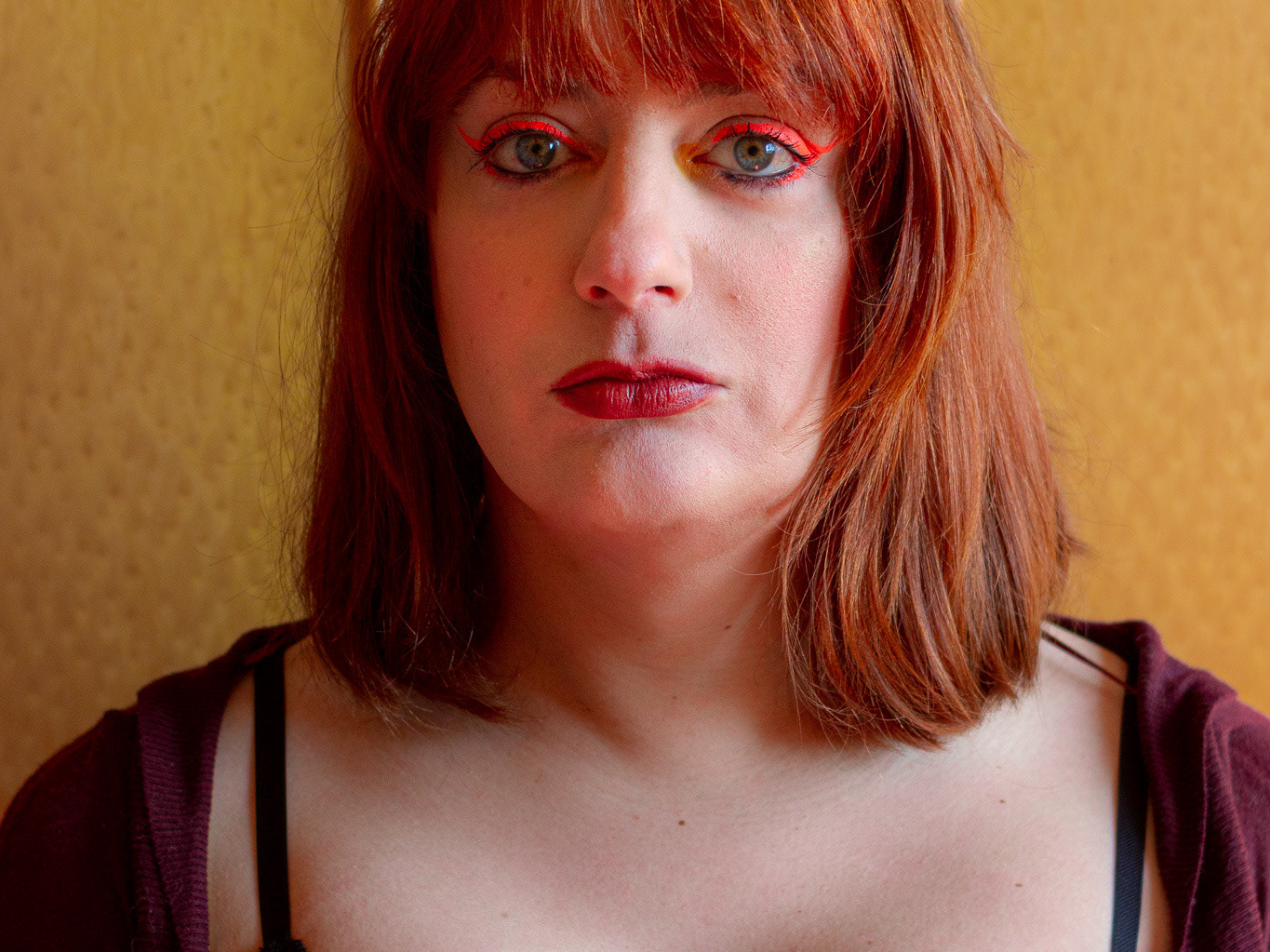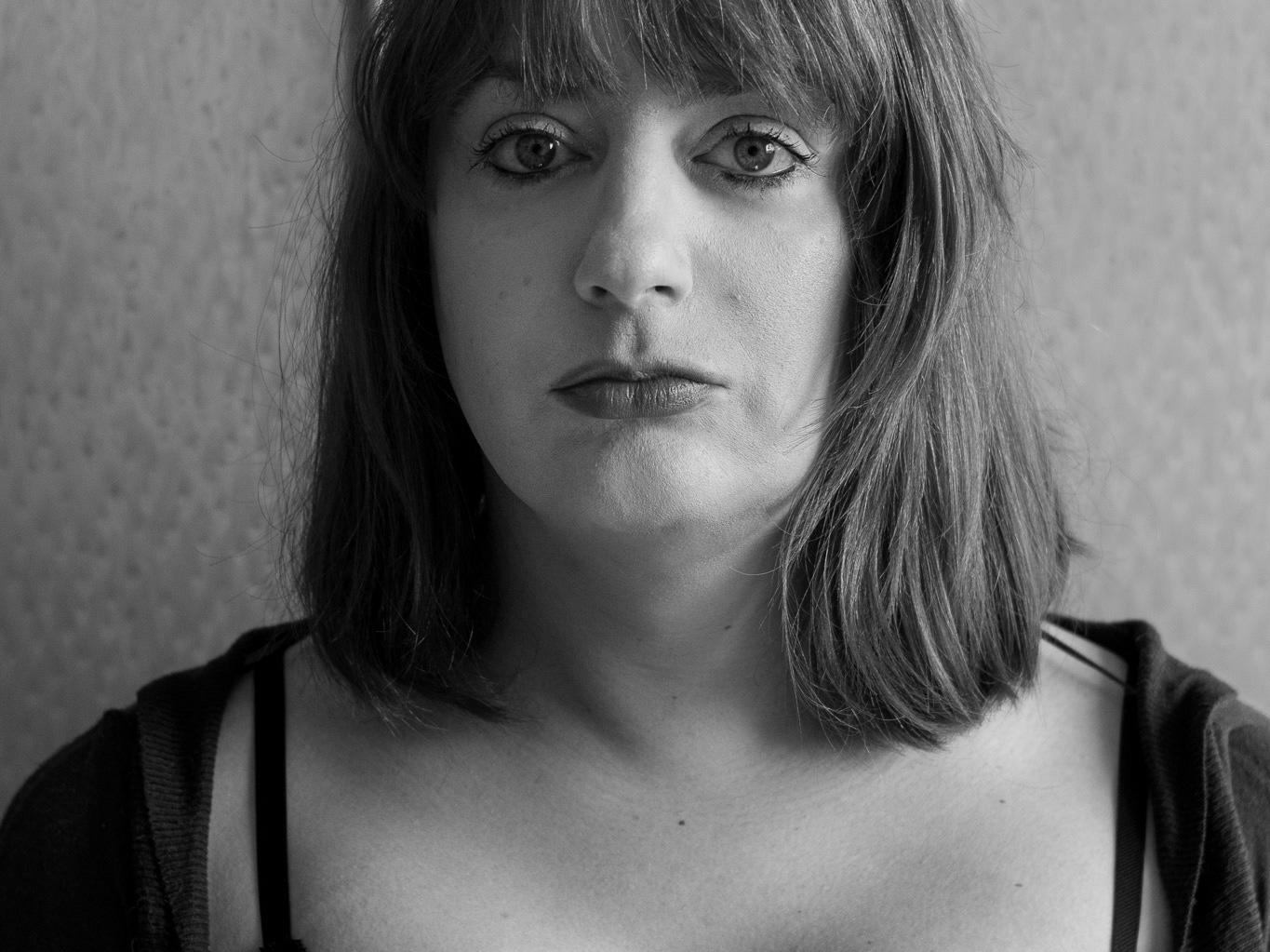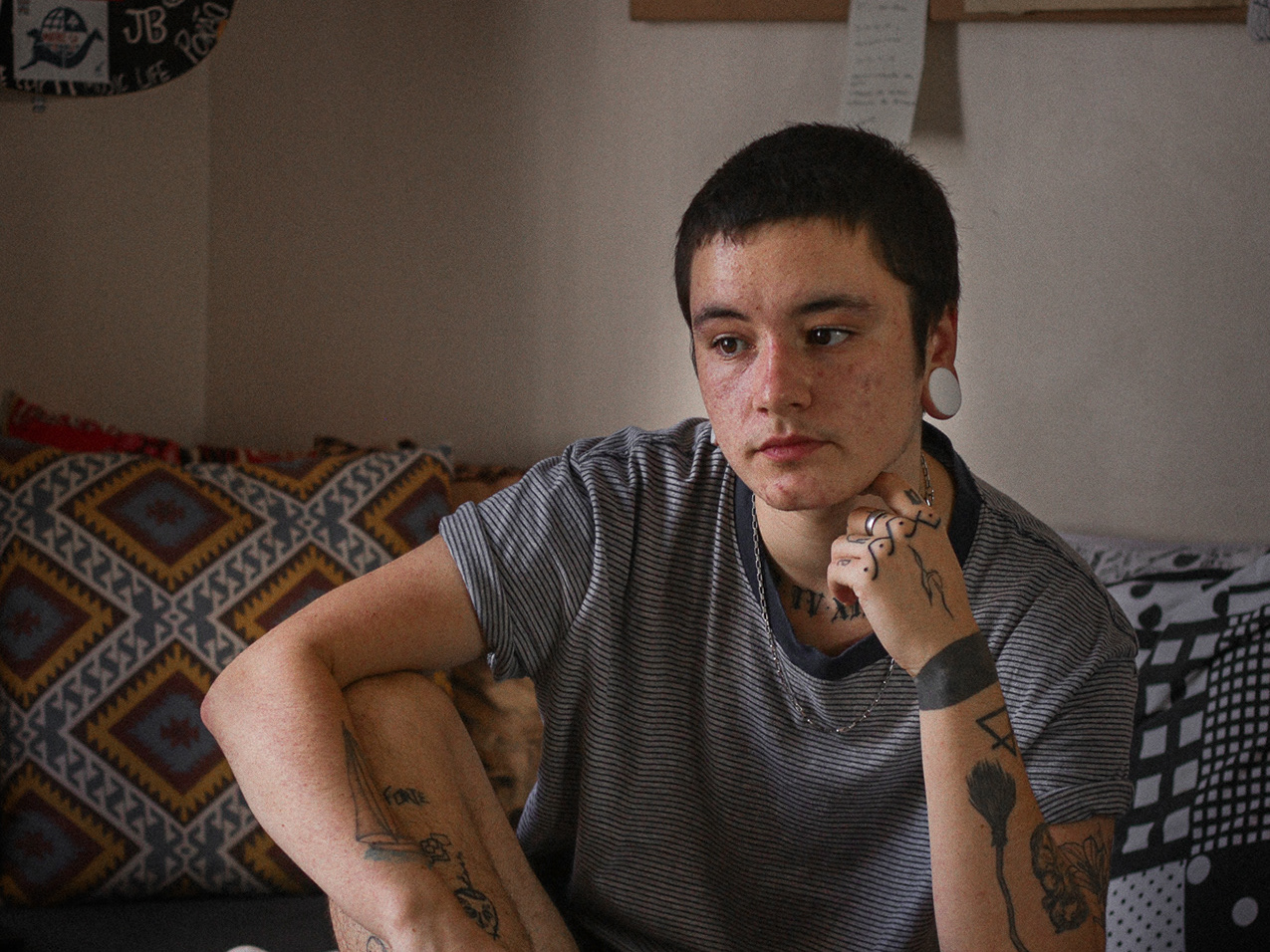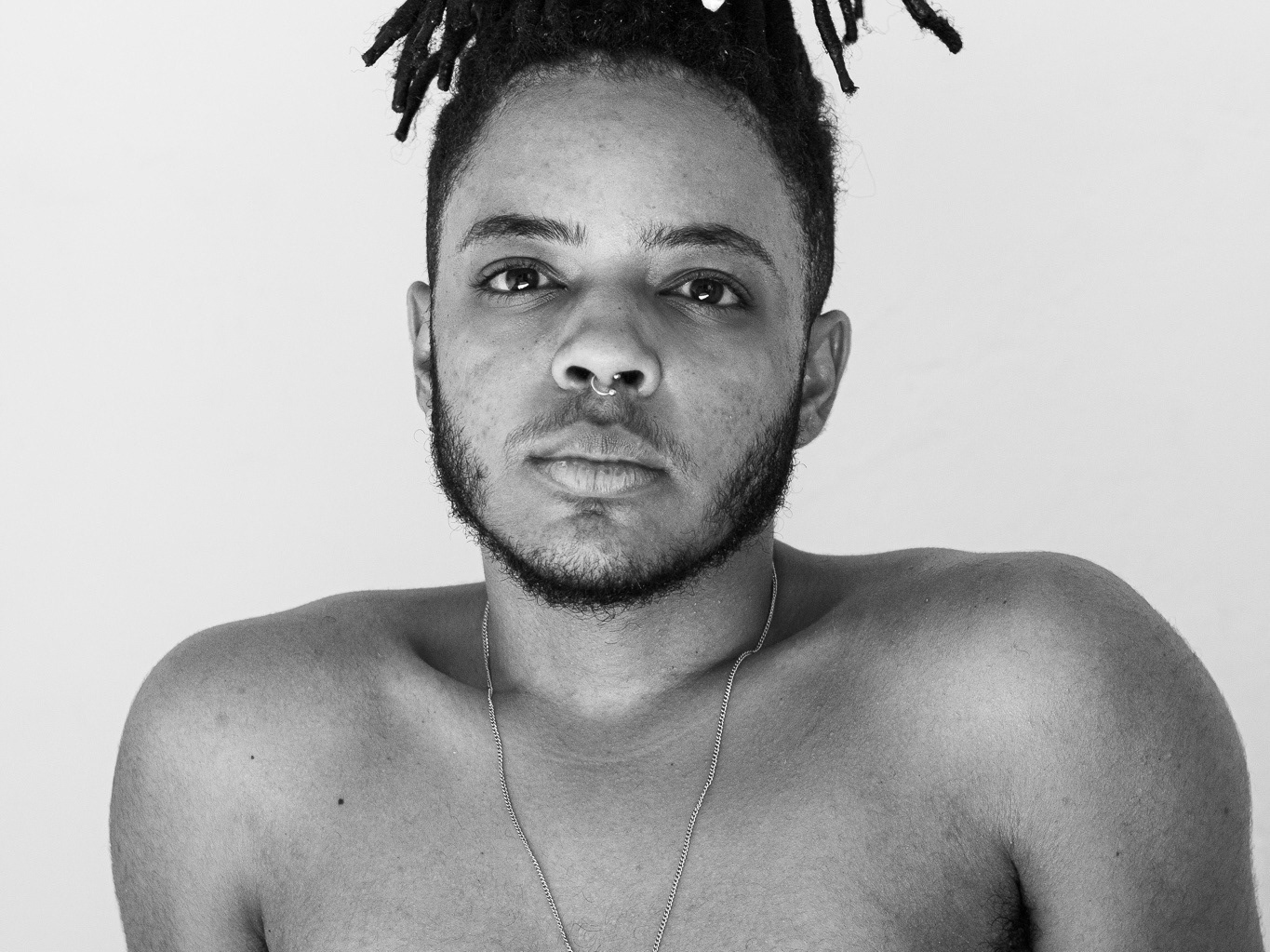I am Lau, I'm 27 years old, I am living in Montenegro again. I was born here and I'm studying visual arts at Uergs. I'm still at the beginning of the course, I think that's it. Oh, there's the thing about the identity, right? I think, I din't know, that lately I'm identifying myself as transmasculine after a long time identifying myself as a trans man. And, I don’t know, I’m a little more comfortable, like, giving up the “man”, trying to access that identity from being trans than from other things, you know? I have this desire to be more trans than a man, to build an identity more from there.
I think that for a long time I was just a child and then this great game comes, this scheme of heterosexuality and cisgenerity, where sexuality… where people start to see me as a dyke when I am very young: I am not a dyke and I I'm not straight either, I wasn't interested in other people that way yet. So I become a dyke before looking at a girl, before I feel desire or attraction to a girl, I am already seen and treated like a dyke because I played soccer. School starts to get awful, I start to be very mistreated and then there is this great moment that I am 16 years old and I realize that I am being absurdly mistreated for being a dyke and I am not a dyke. Also, I had this idea that I was not straight because I was not able to engage in this idea of sexuality because it was not something that was present in me yet. That's it, I realized that I could make that choice: if I'm going to be something I'm not, then I'll choose the easiest one. I'm going to be straight, I'm going to be a straight cis woman.
I did not access this possibility of not being a woman. Then I started dating a guy who is my best friend, we played video games, watched "Prison Break", played and watched soccer. And in some sense it gets easier, my schoolmates start to treat me well - especially this: I start to be better treated. Then it seemed like a good choice because it is just the other side, I just continued to be something I was not, because I spent all these years being a dyke without being. Until I don't know, two years later I looked again at cisheteressexuality, I looked again at sexuality, I felt… I don't know… desire for a girl. Then I embraced this place of being a dyke and of being something with which I identify. And then I spent these many years being a dyke and building a gender identity that is to be a dyke, you know? Like, "that's it, I'm not a woman, I'm a dyke". And I lived with people for whom it was possible, we could talk about not being a woman ... I didn't talk about being trans, but I talked about not being a woman. That was when I started to have contact with a queer crowd and those possibilities. In an X moment I decided to hormone myself, still on that trip of being a dyke and building a dyke body, not only sexuality, but a dyke body, an aesthetic.
I stayed like that in Porto Alegre, traveled to São Paulo, to Rio de Janeiro… And when I came back, I went to Montenegro and in Montenegro it was impossible. This was not possible. Either I was a woman or I was a man, I needed a more accessible speech, I think. Because that's it, there was this thing of, I don't know, being understood, of not being able to demand respect for an identity that was not identifiable. Everyone always called me "Strange", that's how my friends knew me. And when I came back to Montenegro it was impossible for me to have this name, to have this body, to understand myself this way. And then I started asking people to treat me in the masculine calling me "Lau", which is a part of my registration name, which was actually a choice for others, I thought it would be easy. Then I started to produce this idea of being a trans man because... I don't know, it wasn't so much my desire, it was more about sustaining a desire first, which was not to be a woman, you know?
And after a while, that identity kind of crystallized and I didn't think about it anymore. I think in recent times I started to think a little more… Now I don't think I have much passability, but as I live in a small town, people already know what's going on, so I can loosen up this hardness a little bit to affirm myself as a man, I get more space to think and build what I’m thinking and building now. Because... I don't know, all of this is very cruel. If there are these two possibilities in the world - being a man, being a woman - when you are neither... there is a dehumanization, an impossibility of belonging, of identification, of being seen. It is not only the world that does not understand you, but you do not understand yourself, because there are no words to talk about it, there is no possible lexicon... At least, I did not access it. I think a lot about vocabulary, I care about that... I think one of the big problems was not having the words. And now maybe I am managing to build a repertoire of words that I can use, words that are not within this lexicon of heterosexuality. I speak of heterosexuality not only as a sexual practice but as a political regime, as a language within that regime, which exchanges with that regime - language building heterosexuality and heterosexuality also building language. So I started to be able to create my own vocabulary, to find the words to talk about me. I hear other people talking about them and I feel like there's more going on now.
Just yesterday I was saying that I even think it’s great that in Brazil we haven’t been able to incorporate the idea of queer as an identity, because it seems that it doesn’t give much possibility to dismember our identities, to let me take ten minutes to explain what that's it, what it's like for me to be a transmasculine person. I have this idea a lot, that cisgenderism and heterosexuality are this concrete thing and that it has its limits very well defined and that anything that happens outside this place is out. And it seems to me now that being out of that place is very broad, as if we have a lot of space to talk and live things. Because that is it: from the moment you are no longer there… I don’t know, everything that isn’t there, isn’t there. And then I stay on this trip that we are more than that, that… I would like to think that not being cis is complex and that there is a lot to talk, think and explore here, you know?
For me it is important to understand where the name that I am using for myself comes from. And when I speak of language, that's it: transgenderism only exists as an "outside" to regulate cisgenderism. The people who gave us a name were probably not trans. The possibilities for my existence were created from a language that is not mine. Those who invented, who gave the name to my pains are people who were just looking at them, they weren't feeling it. Sometimes I think it's super cruel that I have to call it dysphoria, because I know where that term comes from, I know what it’s for, I know what it’s regulating. I am not saying that dysphoria does not exist, I am saying that it may be cool to look at it carefully and try to understand it by a logic that is not so pathologizing. Because that's it, all of our names come as a pathology. That is why I say that creating language is so important, so that we can create our conceptions and our categories and that they do not start from this alone. That the names that we are going to use for us do not serve only to regulate cisgenderism, that they are not names only for the other. The main thing about transmasculinity for me is the de-identification, not the identification. It's not about identifying with being a man, it's much more about not identifying myself with things that were imposed to me and, later, identifying myself with masculinity, you know? It is to look at what this masculinity is, it is to look at what this place that I am somehow looking for is, and then question it. It is to build this body so that it does not establish an alliance with violence, this identity where the only possibility, the only way of life, is through violence. And to try to build an alliance with people who don't want this to be the only way of life.
I think that masculinity has these several layers, it’s not just aesthetics, it’s not just one thing… I got to a point in my transition when I’ve been taking hormones for five years now, so I know I can’t wait for more aesthetic changes. Then, during the pandemic, I mourned for that, for looking in the mirror and knowing that I will not have more passability than I already have. But after that moment, I understood that, yes, there are ways to be more passable than I am now, which is mainly making this alliance with violence. For example, if I stop sitting like this, if I uncross my legs, if I speak louder, if I hit the table, if I treat you badly, maybe I will look more like a man. I kind of understood that giving up violence is somehow accepting that I will suffer more violence. So I'm in this constant game of “how far do I go to be recognized and respected the way I want to?”, but also thinking about who I need to stop listening to, who I need to stop caring for in order to get that respect, you know ? It is a kind of cruel perspective, it is cruel that we need to make these choices, but for me it is also about this, about thinking about it.
I live with Guto, my brother who is 14, and until then he is a cis man. And this effort makes sense to me because... it is not just an effort, sometimes I feel that this is to defend myself; not accepting what masculinity gives me, which is that possibility of violence and superiority. That I also know that it is a delusion to think that this superiority presents itself as whole, because I know that as a trans person I will never reach this place, but I know I could get closer. But I think that's it, it's a defense because it's not just like I avoid talking out loud because I think it can be bad for other people, it's because I don't want to talk out loud. It's because I want to be cute or sweet, I want to treat people well, I don't want to have to be that kind of guy, so I think it's a defense and care that I do for myself to look at masculinity and not want things that it could give it to me, even if, I don’t know, sometimes I want it (laughs).
Because that's it, right? To use violence to avoid suffering violence. And that is also to establish this alliance, it is also to reiterate that. But I have also been able to identify other forms of life. I managed to give back things in a way other than fighting, because I think this is the maintenance of things, that we can only return violence by using it. That’s why I’m so into this idea… I’m always thinking about and reinforcing language creation. For affection mainly. Because ok, that's it, we're here and nothing that exists is for us.
I once posted on Instagram talking about a day when I was watching 101 Dalmatians and at the beginning of the film there were dog owners walking their dog on a leash. And the owners were always similar to their dog. There is this trip, that I watched this movie and, of course, it was not such a rational thing, but now I realize that when I was little I thought I would have an owner like me and not a dog like me, because I felt so little, I thought I was so little like one of those people... All the images that existed ... People didn't look like me, I didn't look like a prince or a princess, I didn't identify myself so much that I started to think I was a dog, you know? I don’t know, that’s why I’m talking about being able to create other images. And I think that being trans is about that, about other images, other words for us to identify ourselves, for us to belong to something. I think this is important because when I was watching this film I realized that I built very little imaginary when I was little, I didn't imagine a future… I have few images... I see people saying “when I was little I thought I was going to have such a house, that I was going to date that person”. And I don't have those images. It was a short time ago that I managed to start creating a future for myself because it is a short time ago that I started to understand that I am a person, that I am in the world although there are not many things around me that look like me.
I once posted on Instagram talking about a day when I was watching 101 Dalmatians and at the beginning of the film there were dog owners walking their dog on a leash. And the owners were always similar to their dog. There is this trip, that I watched this movie and, of course, it was not such a rational thing, but now I realize that when I was little I thought I would have an owner like me and not a dog like me, because I felt so little, I thought I was so little like one of those people... All the images that existed ... People didn't look like me, I didn't look like a prince or a princess, I didn't identify myself so much that I started to think I was a dog, you know? I don’t know, that’s why I’m talking about being able to create other images. And I think that being trans is about that, about other images, other words for us to identify ourselves, for us to belong to something. I think this is important because when I was watching this film I realized that I built very little imaginary when I was little, I didn't imagine a future… I have few images... I see people saying “when I was little I thought I was going to have such a house, that I was going to date that person”. And I don't have those images. It was a short time ago that I managed to start creating a future for myself because it is a short time ago that I started to understand that I am a person, that I am in the world although there are not many things around me that look like me.
That's why I talk about these alliances that we make, about finding people who look like us so we can understand that yes, we exist, we make sense, that it is fair that we dream things, that we want things as much as it seems that in the world there are no other people like us. Like, people in the movies don't look like me, what people say doesn't look like what I would like to say, and then I meet these people and I create this, I create a language for the affection that I have for these people. The language of heterosexual affection doesn't work for me, even though, I don't know, probably if you see me on the street I will be seen as heterosexual because I have more relationships with women. But even so, as much as visually it looks like heterosexuality, it is not. The way I unfold these affections is not heterosexual - first, because I do not earn this from the world, I do not earn much from the possibility of heterosexuality at first.
And, after a while, I don't want it anymore - I want to invent something else. I am not saying that I am not straight as if the other possibility was to be gay, I am saying that I am not straight because I do not engage within this regime, I do not like people that way, my affection doesn't work that way. So there is one more thing for me to de-identify myself. And I think that lately I have made a point of de-identifying myself with this because that is not what I want to reproduce, I do not want to ask permission to exist in a place that I do not agree with. It doesn't make sense... Why would I want this shit?I am sometimes a little afraid to talk about these things because I know that there is a place of lesbianism that deals very badly with the possibility that I, as a transmasculine person, say that I am still developing, I unfold my affection from a stupid place. Anyway, I am not putting these things as "the" experience of being a dyke, it is my experience of being a dyke. I don't think it will affect the place of women who are dyke or women who are lesbians, I don't think it's that dangerous.
Several radfem speeches were already spreading in Porto Alegre when I started doing this, so I didn't tell anyone. It was a moment when Porto Alegre was shit about it, I was afraid. It was about five, six years ago. I was a little scared, so I started doing it hidden and shortly after I left. And so I was traveling a lot, always changing places and my face was changing too. I changed cities and my face, my body, were different every day. Then I stopped at a place and I got in more contact with people who talked about being trans and I don't know ... I suffered a lot to ... At the beginning of my transition, apart from my fear of the speeches that were around, I was very afraid of losing this thing that was being a dyke, which was so important to me, which is so important to me yet, of not being able to be anymore, you know? I had learned to like people that way, I didn't know how I would like people if I were no longer a dyke. Was I going to be a straight guy? I had so many horrible experiences with straight guys around me, my friends, the people who live with me. Then, after a while I understood that I was not going to lose this, that I could create a category, that I could develop this affection beyond heterosexuality even though at the moment I was identifying myself as a man. I don't know, I think it took me a long time to solve this, I spent a lot of time trying, because ideas are always very binary, like, I have to stop being one thing in order to start being another.
There was this time when I was taking pills and some information was lost. I remember the first time I applied T with a friend, I remember being happy but there are some things I don't remember, I don't know how I bought it. I needed something that could make me deidentify with womanhood, I needed something circulating inside my body, maybe. Now I don't feel that anymore, but at the moment it was that and that seemed like a possibility. Now I don’t get hormones for that, but at the moment it was. I needed something physical, I think maybe that was it. These are the two layers of de-identification, because first I de-identified myself from being a woman and then from being a man. I think there was this moment when POA was difficult and my mental health was very precarious and everything around me was very violent and I needed something, something for me, I think. Something that would value my experience. It was almost like that, as I was somehow telling me that what I was doing was valid. It was a gift, me saying to myself that I was not a delusion and that the violence I was suffering was wrong, that I didn't deserve it. And then I tried to access something that valued my experience. And the hormone was the thing I could think of at the time, but it could have been anything else.
I don't know, I think I was very lucky because ... That's it, we go on meeting people and identifying with them. My whole experience - after I left Montenegro, I had a lot of trans people around me, so everything was always very networked, I discovered a lot of things about me seeing these other people and living with these other people and transitioning with these other people. There was this moment that... I think it's really crazy because sometimes I talk about things and start to remember things that I didn't remember anymore. There was this moment when I started to use hormones, maybe it was the moment when I was more alone, because I lived in an occupation of dykes, where at a certain moment the speech became very violent, like “women who love women”. And we stopped receiving people, we stopped receiving trans people and it was the house where I lived... And I wanted to use hormones, it was a lot about that, about losing space. So I started to use hormones without anyone knowing, walking with hormones hidden in the backpack. There used to be meetings for hours and hours to decide whether or not trans people could attend this space while I was there, I don't know, kind of participating in the conversations and feeling kind of like I was invading the space.
But shortly after I left there and met several trans people, I shared my life with several people. I had a partner, who is a friend to this day, and who introduced me to several people. She was always in those spaces because I think that was what made sense to her and then she took me with her, I met several people, so not having a place didn't last that long, you know? Because that's it, I have this thought that many times we keep talking about this non-place, “oh, the non-place of the trans person, etc.”, but I think that this is actually a huge place, where there are many people and still several things for us to think and do yet. I'm in a moment when I'm excited, you know? Being that seems like a good thing, it seems that it solves… It seems to me that this is finally a solution, you know? Of course, it is not a perfect solution, everything is not great, but it seems to me that it solves several problems that I have had of non-recognition throughout my life ... Not to be a man, not to be a woman, not to be cis. It's super powerful, I see that in this place there is space for me to think about several things that I couldn't even think about before, that I didn't even have words to talk about it and that now there is so much.
I have been doing a search for trans corporealities in antiquity in my college research.And the main thing about this research is that at first I was looking for art objects in Greek Roman antiquity that would make it possible for us to question the cisgenderism of those bodies. And now I'm in a moment of research when people say “no, but this is anachronistic, you cannot say that people were trans because this term didn't exist at that time”, but then you think about it and realize that cisgenderism also does not! And it's always like that, it seems that what is not stated is there, it is natural. Cisgenderism is natural, it is neutral, it has existed since the beginning of time and transgenderism is a modern invention. And then I can't question the cisgenderism of these bodies, only that I actually can! (laughs) The image is a device for affirming cisnormativity, a device for maintaining it. We look at all these bodies and are sure they are cisgender even if they are dressed. That's the thing, I do not need an environment that provides a clue of transgender-ness, because there is also no environment that gives clues about cisgender-ness. In fact, it's just the reiteration of the norm, it's just people making sure that only that has been around forever. And maybe I can say that Monalisa is trans with the same certainty that people say she is cis, because she's dressed, you know? So what's up? (laughs)
The shit is huge, it's huge to think about it, to live. That's it, maybe that's why I'm excited now to make this search to give us a historical belonging, so that it doesn't happen what happened to me, so that when people are not a man or a woman they don't have to think that they are a dog. It is very violent, very cruel that people have been made invisible, that our stories have been badly told. And making this search makes a lot of sense to me to understand that this is all about past and present violence and that looking at it is also trying to establish a more possible future, not only possible but good, great, perfect.
Montenegro has UERGS (State University of Rio Grande do Sul), which has courses in dance, theater, visual arts, music, so all LGBT people go there and that changes the city a lot. Because Montenegro is a city of German colonization, it is an extremely racist, conservative, lgbtphobic city, but there is Fundarte and UERGS and because of that, things change a little. Because these bodies are circulating in the city and for what these bodies produce as art, I think that this really changes the city. If you go to cities near Montenegro people will be speaking German dialect and they will probably start talking like that because they do not even want to communicate with you if you are a strange body. So that's it, it's rotten but there is UERGS... there are other things circulating, crossing the city. And I came back to Montenegro more or less well understood, knowing what I want, what I will accept and what I will not. And of course, making concessions of "ok, from now on I'm a trans man because that's what you understand", but kind of doing it as a defense because I'm kind of intolerant. When I get angry I get really angry and I knew I didn't want to fight anymore, so I needed to make this identity as intelligible as possible, because I knew I didn't want to live in conflict.
So okay, I do that, I come here and shortly afterwards I'm working as a chapist in a rock bar and then I propose to the owner that we have a party and he lets me do it. This party is called "drag-se" [wordplay meaning to "become" a drag queen], which is the first party with a drag show in Montenegro. And several LGBT people are going to this party and the owner was disgusted and offered me the bar to rent. I rented this bar and it became an LGBT place and I only hired LGBT people to work there, because UERGS doesn't have a student's house, it doesn't have a university restaurant. And as it is a conservative city, it is difficult to get a job. Then I basically hire LGBT people, mainly trans people, who study at UERGS. So I live there at the bar, working hard but also in contact with all these people all the time and Montenegro becomes this place.
When we were younger I used to hang out with several LGBT people in Montenegro. I was straight and walked around with a lot of fagots and dykes and we couldn't go to parties, we didn't go to parties, we used to drink in a corner of the square and sometimes even hiding in an alley because in the square we got in trouble several times. Then when I come back, several years later, I have a bar where all LGBT people go to and we get reports from straight cis people saying that they didn’t feel comfortable there and I’m “ok, this is it, I felt like this my whole life". So Montenegro becomes kind of easy… But in the middle of that there is the election of Bolsonaro and several people start to pass by car shouting horrible things, throwing bottles inside. I start to have to call Uber for the employees to leave, one by one, and I have to wait for them to get home at night because there was this moment, which was not only in Montenegro. But we managed to build a cool network and then a lot of things happened there, a lot of people started to transition. There was this time when the mother of a trans girl called me because she was a minor and could not enter the bar. And then the mother asked us to please let the girl in, because she knew it was the only place where her daughter would be safe and she wanted to celebrate her birthday there. And then I see this 16-year-old girl celebrating her birthday in a bar I'm managing, with several friends around, you know? And then I'm like, "Fuck, if that had happened to me, if I could have celebrated my 16th birthday at a trans man's bar, with several people around me ...", you know? That, you know? It made a lot of sense to be there, to have worked so hard… it made a lot of sense. When I saw Gus sitting at the bar and someone said "oh, he is a trans man too", I was ... Cool! He was there with several friends, drinking with people who were treating him well and he was being treated well by those who worked at the bar because these people were also trans. It was very important ... Casa da Esquina was very important ... Financially for several people. Of course, it was not absurd, but it paid better than the other bars in the city and I think it helped some people to stay at UERGS even, because they were working. It made me make peace with the city too. Casa da Esquina closed, like, two years ago. I was already in contact with many people at UERGS, I didn't study there yet but I was in direct contact with people at UERGS. I did several things to try to move… I don't know, for example, I didn't use the bar in the afternoon and UERGS has a little difficulty in lending rooms for students to rehearse, because there are few rooms. And then I would lend the bar to people to rehearse there. Then there were people from UERGS rehearsing, doing shows, doing performances.
Then there was this moment when I was talking to a friend who is a drama teacher and she said something to me… Because I was very anti-academy, I am still a little. Not anti-academy, but anti-some things I'm trying to do differently. And I was sure I would never go back to the academy. And then I was talking to this friend and she said to me "it's really great what you're saying, but you're telling me here in this bar, you could tell more people, for children, UERGS has a degree for teaching". I was like "oh, no, no way". And she said something like "just make sure you don't want to do this because you don't want to and not because you can't". And I came home and thought that maybe I really thought that I couldn't, that I couldn't be a teacher because I'm trans, that I couldn't think things or produce theory or art because that's not what is expected of this body. And I still don't know exactly how… what it is to be a trans person producing art. I don't do anything very different from what I did before entering college, it just seems that now it is a little more legitimate.
I think it gives me a sense of commitment, because tend to I devalue a lot the things I do and now it seems that I can at least commit myself a little more to them, but… I'm in conflict, I have a project now that I don't know if I do, if I don't, if that's what I want, if I want to produce art or if I just want to research. It's so crazy, I make a scribble in the notebook and put a photo on instagram, you know? And that's it, maybe that's it. There's this thing ... Probably the thing I like the most I've ever done is that of "being a real man vs. being a fake man". And then there's that, whether it's art or not. But it doesn't matter, it's just what I was thinking and feeling and that was the way I managed to do it.
And who wants to produce real art, you know? Fuck it. I don't even know what that is.
But I have a little bit of this trip that sometimes it is a little difficult to produce art as a trans person because… I had a dream once that I was in front of UERGS talking about something that was very important to me and nobody paid any attention to what I was talking about. It was something about art, it was something that was important, that I was very excited and no one listened to me. Then when I was going to cross the street I was run over and it became a big thing, it called a lot of attention. And sometimes I have the impression that this is what is expected of a trans person in art, that they bleed. I am expected to bleed inside a gallery while everyone watches and then they just clean the walls and paint it white again. Sometimes I have the impression that this is very much linked to precariousness, marginalization and kind of the show that this turns into, because it seems that this is what I have to give as a trans person: a great bloody show. This is not what I want to do, I want to produce things for trans people to identify themselves and tt doesn't mean that it will always be happy, always nice to see, but it means that it is no longer the logic of the freak show. I don't want to be bleeding to entertain others, you know? It is no longer... I think that for a while I engaged in this logic and that now I don't want to do that anymore, I want to produce with and for trans people. Perhaps this is the most concrete idea that I have in relation to art now.
What regulates the trans experience is always pain, always suffering. It is obvious that we will not say that it does not exist, because it exists. But if we put our whole existence into this, the process of understanding a self as a trans person will continue to be horrible to everyone, it will always be this suffering of “my god, but will I have to be that horrible thing?” . And yes, it is horrible, but there are other moments, there is this girl's birthday at the bar, there's this moment when I have met Gus, there's we talking now, there are these other things ...
I have a work that I did a while ago called "intrawalls", it is a series of collages with words. And people are shocked when they look at it, like “What? But aren't you trans? Where is it?". And it's about these letters, and maybe this is my most transgender work, you know? Because these are love letters, not always about romantic love, not always about sex-affective relationships, but letters where I am creating language for my affection, I am developing it, I am inventing a way of telling people that I love them. Because they didn’t teach me to do that, they told me that love wasn’t something that would exist in my life if I transitioned. And then I do this work and people look at it and say “but weren't you trans? we are expecting trans things from you”. And this is my most transgender work, the one that most relates to my transgender experience. My body is not there, there's no transphobia, but I am being a trans person and producing affection.
It's not like we can access this thing, affection.
[film photography - dev/scan by Lab:Lab]
People are not prepared for me to be happy, they are waiting for me to be miserable, for my experience in the world to be completely horrible, but at the same time they are not doing anything to make my experience in the world better. They are just reaffirming that “yes, really, poor thing“. And nobody expects me to be loved or that I love someone, that I am happy or that I have moments of happiness. That's it.. It's this thing of having been expelled from the paradise of cisheterosexuality and at least being able to create something else .
When I came to visit [my family] I was already getting hormones, but I was not sure how to communicate this experience. And I don't remember the day I told my mom that I was trans because I don't think this day existed. I don't remember the day I thought I was trans, there was no big reveal day, it just happened. My family is really nice, my dad sometimes... there's this logic where he feels that he left me be a man and that then I should strive to be the best man possible. The best man possible being a man who, I don't know, stands at the window with him looking at the women passing by on the street and talking about their ass. And when I don't do that he is kind of offended, like “what are you doing? I let you enter masculinity and you are not living up to expectations ". But other than that he is fine, it is more like a homophobic than a transphobic thing, he doesn’t want me to be a fag… but other than that he’s fine. These days he called me to tell me that he got a job for a dyke who is his neighbor. I thought it was cute that he wanted to tell me.
My mother is chilled, she is perfect, she loves all my friends. We had a trans party at her house, she loved it and wore a dress in the colors of the trans flag. And Guto.. Dude, Guto is perfect since always. I told him once to call me Lau, and he never made a mistake. Never. And he… I don’t know, we talk a lot about this trans thing and also about various things, we talk a lot. And recently we managed to talk a little about masculinity and not only about mine but about his, because that's it, right? It would be nice if it weren't just trans men who question masculinity. I think this exchange that we make is perfect. These days we were studying together, he was studying sets in mathematics, like “you have three shorts and three T-shirts, how many sets can you make?”. And the teacher gave a job that was “at a party there are x men and x women, how many couples can you do?”. And I was like “wow, what the fuck, compulsory heterosexuality !!!! let's skip this one”. And then he sent me this [showing cell phone]. He said “Lau, I did what we said”, then he said: gay couples x, lesbians x, straight x. Very smart, he is very cute. Then I said that he was intelligent, understanding and courageous. Then he said “thanks Lau, I learned all of this from you and now I can advise others thanks to you”, very cute! He is very willing, it gives me a lot of happiness. He has a 15-year-old trans friend and this boy's grandmother owns a small market behind my house and she asks me questions… When I say that being in Montenegro is cool, I talk about this kind of thing, because maybe it's not just about the great things, maybe this is a huge mini thing.
And Guto comes back from school with him, he sees me at the grocery store and comes to talk to me, you know? I get very excited about it, that’s why it makes me so happy this thing about children, to see that they are so cool, they know a lot of things. Guto has several friends who are bisexual, they ... I think it will be a little easier. I was very afraid of what was going to happen when Guto was that old, because my experience was horrible. At about 12 years old it started to be horrible for me, so I was very afraid of what was going to happen to him, of what life was going to be like. I was afraid of having to revisit these things, but in fact he is experiencing something that is completely different, he has several LGBT friends, he doesn't assert himself as straight even though he talks more about girls and is now dating a girl. And then when I see this cute little trans boy walking around in the neighborhood, with several friends and being treated well by his grandmother, I'm like "wow, that's it". I also know that this is not everyone's experience, but seeing some experiences like this is already different from what happened to me.
I really believe in this thing of imagining other things. I think it is very radical for us to imagine that it will be cool, that the trans experience will not always be this, and that these violence that we suffered will stop happening. I like to imagine these things and then when there are children around it seems that it becomes easier to imagine.
[film photography - dev/scan by Lab:Lab]
Lau Graef
1993.
Visual arts student at Uergs - Montenegro. Member of Guapes Collective: autonomous study group on self-care and well-being practices for trans activists. Works on developing possible languages as a survival strategy for non-hegemonic corporealities. Self-employed activist.
*essay from February 2021, Montenegro (RS).
-
This project is made by me, Gabz. I am a non-binary trans person and I seek not only to portray but also to open a space where other trans people can tell their stories, so to support our own community. After suffering a lot from the lack of trans narrative references that contemplated me, I realized that these people exist and have always existed, but for CISthemic reasons the few times we have the opportunity to tell who we are ends up being through the lens of people who do not know how it is to be us. I started this project with urgency.
I offer all this content for free, as I do not want to privilege access only for those who can pay. However, for this project to continue, I need your help. Share on your social networks! If you have financial means, you can also make a single or recurring donation. Even $1 already helps make this project possible. Help me help us!
